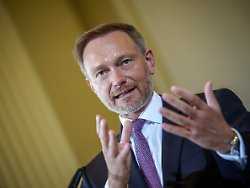Changed fiscal policy from 2023
Lindner plans “Exit from crisis mode”
May 11, 2022, 4:46 p.m
The corona pandemic and the Ukraine war are putting the German economy in a permanent crisis. Finance Minister Lindner wants to end this from 2023 and significantly change fiscal policy. Government spending is to be reduced and companies strengthened. There should be significantly more growth again.
Federal Finance Minister Christian Lindner wants to change course significantly from next year. To this end, he presented a new strategy for financial policy in Berlin, which, however, has not been agreed in the traffic light coalition. It is intended to serve as a guideline for his ministry. A much stronger focus on the needs of companies is envisaged, while government spending is to be kept in check. After numerous special burdens caused by the corona pandemic and the war in Ukraine, there must be a turnaround, buffers must be built up again. “From next year, a different phase of fiscal policy will begin.”
The debt brake anchored in the Basic Law should then be complied with again in a difficult environment – with high inflation and lower growth than expected. The new borrowing must be radically reduced. “You have to find the exit from the crisis mode.” For the necessary investments there is also the climate fund and the special fund for the modernization of the Bundeswehr. A self-sustaining upswing is needed. According to the FDP boss, priority is given to everything that reduces price pressure and increases company productivity.
The growth forecasts for Germany, which were recently lowered because of the war in Ukraine, are warning signals. “Low growth coupled with rising inflation is a dangerous combination. We mustn’t underestimate the risk of stagflation. We’re not doing it.”
Tax cuts difficult to implement in the traffic light coalition
Lindner added that he was working on further tax relief. The burden on companies is too high, Germany even ranks behind France here. He advocated a complete abolition of the solidarity surcharge, which entrepreneurs would feel most quickly. However, Lindner conceded that there was no majority for this either in the traffic light coalition of SPD, Greens and FDP or in the Bundestag.
A reduction in VAT brought into play would not be limited and not targeted enough, according to Lindner. “I would say that’s not what we need.” Consumer demand is already strong. Economic stimuli are therefore not in demand. Despite full order books, there is a lack of supply from companies, which are currently often struggling with supply chain problems and groaning under the high energy prices. Lindner added that without the Ukraine war he would have presented the new strategy earlier.
Debt-financed government subsidies are the wrong approach. He cited the construction industry and electromobility, which has already been heavily promoted, as examples. Economists had recently warned more and more often about a wage-price spiral. Lindner said there was a risk that companies and unions’ increased inflation expectations would be reflected in collective bargaining. That could perpetuate high inflation. The state must avoid extensive transfer programs, higher consumer spending by the public sector is counterproductive.
